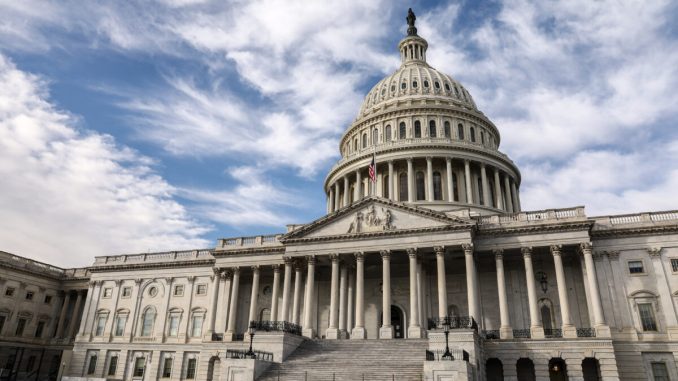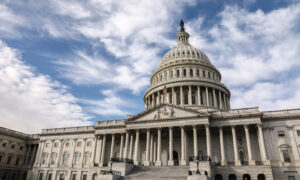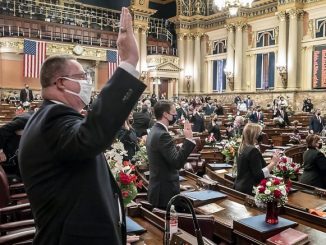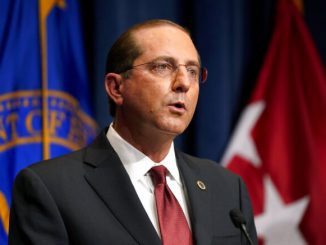

Labor unions could see a huge boost in revenues estimated at $9.3 billion in dues from workers if the Senate passes and President Joe Biden signs the House-approved PRO Act, according to a new study.
The Protecting the Right to Organize Act (PRO) was approved in March by the House of Representatives and is now being considered by the Senate Committee on Health, Education, Labor and Pensions. Biden has promised to sign the measure if it comes to his desk.
The PRO Act vastly expands the power of the National Labor Relations Board (NLRB) to use its regulatory authority to reinforce organized labor’s efforts to expand its membership after decades of decline.
It also would nullify the 27 state Right-to-Work laws presently on the books and enable unions to collect mandatory dues payments from employees who don’t wish to join a trade organization.
“If enacted into law, the PRO Act will likely result in increases to the private union member rate. This will increase the number of dues-paying members who fund labor organizations, increasing labor organization receipts and enabling unions to increase their disbursements,” said the study by the Institute for the American Worker (IAW).
The IAW is a conservative non-profit that advocates for free market reforms and should not be confused with the AFL-CIO’s Working for America Institute.
“If the private sector union membership rate returns to where it was within the last several decades, this could conservatively mean an increase of $9.3 billion in dues receipts within the universe of labor organizations that file [LM-2] reports with [the Department of Labor’s Office of Labor-Management Standards (OLMS),” the study said.
“This would allow unions to increase their disbursements for everything from politics to landscaping, expanding their power and influence greatly,” the study continued.
The study’s projections assume union membership would either be increased to levels not seen since 1983 when, according to DOL’s Bureau of Labor Statistics (BLS), the nationwide total was 16.8 percent of all private sector workers or since 2000 when the rate was 9.0 percent.
Currently, 6.3 percent of all private sector workers are union members, the lowest level in many decades, but still the source of $11.1 billion in annual dues revenues, according to BLS data cited by the study.
If membership increases to the 2000 level, dues revenues would increase to $13.5 billion, while an increase to the 1983 level would produce a $9.3 billion hike.
The two assumptions are necessary because, the study explains, “most, if not all, labor observers believe that enacting the PRO Act will lead to an increase in the private sector union membership rate and those required to pay fees. This has been widely accepted in public comments on the pending legislation. How much the union membership rate will increase, however, is subject to debate.”
Labor unions spent $791 million on political campaigns and activities in 2020, almost exclusively on Democratic candidates and causes, according to IAW. Such spending would spiral to $961 million under the 2000 assumption and to more than $1.5 billion under the 1983 assumption.
The steady decline since the Reagan era in union membership has resulted in part due to the spread of Right-to-Work laws to a majority of the states, as well as to aggressive efforts during President George W. Bush’s eight years in the Oval Office to enforce the LM-2 financial disclosure requirements.
Continuing convictions of union leaders for serious offenses has also damaged the credibility of labor organizations with workers. Just in the first four months of 2021, 10 union officials have been convicted or indicted in such cases, including:
- United Steelworkers Union Local 1731 President Trey Huffy pled guilty to stealing more than $37,000 from the union.
- Former Ironworkers Local 470 Treasurer Scott Merritt took $50,850 from the union for his personal use over a seven-year period.
- Salvatore Tagliaferro, President of the Local Chapter 926 of the United Brotherhood of Carpenters and Joiners of America took more than $70,000 in bribes in return for union memberships. More than half of those members never received work assignments.
- Former National Association of Letter Carriers Union Local 274 was indicated on a kickback scheme in which he filed false worker complaints of violations by managers of overtime rules. Whitbeck is accused by federal prosecutors of then directing settlement funds to members who agreed to kick back a portion of them to him.
- Brenda Walters, then Secretary-Treasurer of the Muskogee (Okla.) Local Area 7 of the American Postal Workers Union, AFL-CIO, embezzled more than $95,000 in union funds.
- Jeffrey Phillips, former Secretary-Treasurer of the International Association of Machinists and Aerospace Workers Local Lodge 836, stole more than $57,000 from the union. His lawyer told the court Phillips did not recall what happened to the money, due to a medical condition.
- Dorothy McBride, the former President of a Communications Workers of America local in New Jersey, was indicted for allegedly embezzling more than $600,000 from the union and using the funds to pay off her American Express and other credit cards.
- Former United Auto Workers Local 1320 Financial Secretary Brian Rittenhouse is charged with embezzling $500 in union funds that were labelled as intended to purchase T-shirts.
- Linda Rogers, former Secretary-Treasurer of the American Federation of State, County and Municipal Employees (AFSCME) Union, and her daughter, Jennifer, were convicted of embezzling $40,455 from the local’s checking and savings accounts.
- Scott Rogers, President of Postal Mail Handlers Local 314 was indicted for embezzling an estimated $80,000 from the union’s bank account. The local’s former Treasurer, Yvette Luster, was indicated on the same charge.
Congressional correspondent Mark Tapscott may be contacted at mark.tapscott@epochtimes.nyc





Be the first to comment